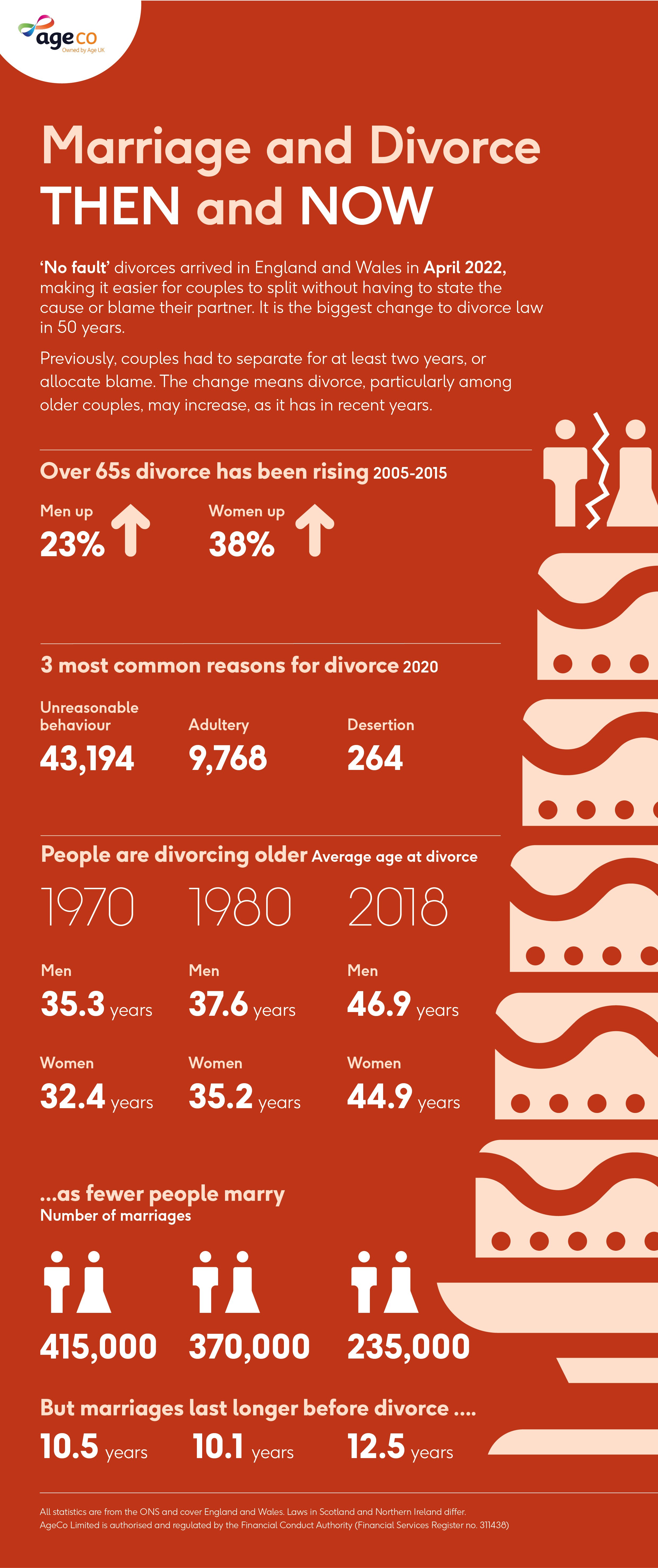"No Fault" Divorce: here's how the laws have changed
4 minute read

Divorce is rarely an easy decision and expert guidance is often needed to get the best outcome. With the arrival of new, “no fault” divorce laws, we explain what you need to know.

Legal Services
Age Co Legal Services offer a range of specialist legal advice and services to help you plan for the future and manage your personal affairs.
Until recently, though, one spouse would have to give a legal reason for blaming the other for the breakdown. The most common reasons for divorce in 2020 were unreasonable behaviour and adultery.
The alternative to apportioning blame was for a married couple to officially separate for at least two years – or five years if only one partner wanted to divorce.
New “no fault” divorce laws
“No fault” divorce laws arrived in April 2022, ending the need for couples to give a legal reason for splitting up. It’s the biggest change to divorce laws in England and Wales in 50 years.
The new laws are designed to make the process better, quicker and perhaps less stressful for some.
What happens to finances and how to split assets hasn’t changed.
What impact could “no fault” divorce laws have?
The number of so-called “silver splitter” divorces – people over 50 choosing to part – has increased in recent years as attitudes to divorce have changed.
This change in the law could see the trend increase by making divorce possible where some people might otherwise have settled for separation.

How long does a divorce take now?
While it depends on the circumstances, a divorce will take at least 26 weeks, although sometimes it can take longer to resolve financial matters.
Making decisions over who owns what after years of collecting possessions together can be hard. And then there are the feelings and emotions that come from having a shared history that includes family, friends and loved ones.
That’s why it’s so important to get good, expert advice should you decide to start divorce proceedings.
How to start divorce proceedings
You can get useful information from Citizens Advice but, for many, an experienced divorce lawyer is essential. When you’ve been married for a long time, determining who is entitled to what and dividing any joint assets may be more complicated. A lawyer can help you manage this process and work to achieve a fair outcome.
Your home is likely to be your biggest asset. But many people underestimate the value of private or work pensions – or don’t know they are usually shared. In some cases, pensions built up over decades could be worth much more than a house.
Assets can include:
- A home, and even a second home
- A business
- Pensions, investments and savings
- Other items such as cars and caravans
How to get divorced: four things to think about
1. Find the right divorce lawyer for you
Good advice can help to make sure everyone gets a fair share of the assets they’ve created together. This is not a confrontational thing. It shows an intention to separate in the most amicable way possible.
A legal expert will look at everything and explain what it means and how the law applies. Just make sure they are experienced in divorce and meet the right legal standards.
The Law Society has useful information for those living in England and Wales, and we’ve also put together a guide to finding a lawyer which you can read here.
2. Make or update your Will
Your will needs to reflect changes brought about by your divorce. Updating it (or even writing one for the first time) can make sure your estate goes where you want it to when the time comes.
There may be your own children, stepchildren, or other dependents to think about, as well as grandchildren, siblings and close friends or family you want to include in your wishes.
Getting good legal advice can be vital.
One thing to know: pensions are not normally covered by your will. The best way to make sure your pension is passed on to who you want it to is by filling out a pension beneficiaries form. Get in touch with your pension provider.
3. Get a financial once-over
From tax planning, and managing your investments or pension, getting solid financial advice is important, especially when you are divorcing and looking to a new future.
You’re likely to need to rearrange things such as life, home and car insurance to reflect the changes in your circumstances.
4. Set up a power of attorney
A power of attorney gives somebody you trust the authority to manage your money if you lose the ability to do so in future. It’s a good time to think about this now, as part of a wider financial – and life – overhaul.
Life after divorce
The great news is that many of us are living longer, healthier lives. And while divorce is rarely easy, deciding to do so in your fifties, sixties or later can be the start of an exciting new chapter.
Listen to our divorce podcast
We’ve recorded a Podcast with the experts at Irwin Mitchell, who provide Age Co Legal Services, all about the topic of divorce which you can listen here. You can also find more information on divorce laws in the UK at www.gov.uk/divorce. Laws in Scotland and Northern Ireland are different.

Sign up to the Age Co Newsletter
Each month, our email newsletter delivers inspiring stories, practical guides to later life, plus the latest news about Age Co and the charitable work we support.
